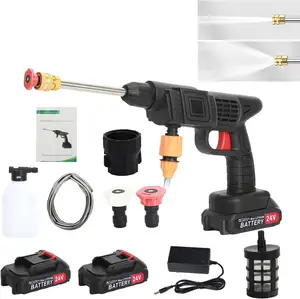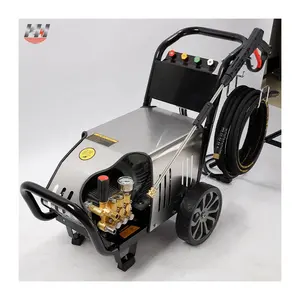(120556 products available)












































































































































































































A car washer is a system or machine that is used to clean and wash automobiles. They come in a variety of types that are suitable for different applications and environments. Here are some common types of car washers:
Automatic Car Wash:
These are also known as conveyor car washes. They are the most common types of car washers that are found in gas stations. They have an assembly line where cars are washed automatically. The car is driven onto a conveyor belt and then transported into the washing bay. The washing bay has spinning brushes, high-pressure water jets, and drying machines that clean and dry the car automatically.
Self-Service Car Wash:
These facilities are equipped with high-pressure water jet machines, foam brushes, and vacuum cleaners that allow customers to wash their cars by themselves. They are usually found in public places where people can access them easily. Users pay an hourly rate for the equipment.
Touchless Car Wash:
In these car washers, no physical contact is involved during the washing process. They use high-pressure water jets and powerful sprays to remove dirt from the surface of the car. They also use specialized cleaning agents to eliminate grime without any physical contact.
Hand Car Wash:
This type of car wash involves washing cars by hand using buckets, sponges, and microfiber cloths. Hand washing is preferred because it minimizes the risks of scratching the car's paint. Hand car washes are commonly offered by mobile car washing services or detailing companies.
Waterless Car Wash:
Waterless car washing involves using waterless car wash products. These products contain polymers and lubricants that encapsulate dirt particles, allowing them to be safely wiped off using microfiber cloths. This method is environmentally friendly as it minimizes water usage and reduces water runoff.
Detailing Service:
These services go beyond basic car washing. They clean and wash every inch of the car, including the interior space. They also apply wax or sealant coatings on the car. These services are mostly offered by professional companies that specialize in car detailing.
Foam Cannon Wash:
This type of car wash applies a foam cannon connected to a pressure washer or garden hose. The foam cannon sprays a thick layer of foam on the car's surface, which clings to dirt and contaminants. After that, a high-pressure water jet is used to rinse off the foam along with the dirt.
Portable Car Wash:
These are battery-operated or electrically-powered devices that are used to clean and wash cars. They use high-pressure water jets to remove dirt and grime from the car's surface. Portable car washers are ideal for people who frequently travel or go camping.
Car washers have various specifications depending on their type. Below are some of the common ones.
Pressure:
Electric pressure washers generate anywhere between 1300 and 1900 PSI, making them ideal for washing cars. The higher pressure is suitable for cleaning tough dirt, like mud, from cars. On the other hand, gas pressure washers produce between 2000 and 3100 PSI. The higher pressure is ideal for professional services where the vehicle is washed regularly.
Flow rate:
Flow rate refers to the amount of water the washer uses in a minute. A washer with a higher flow rate cleans faster than one with a lower flow rate. Electric car washers have a flow rate of 1.1 to 1.5 GPM, while gas washers have 1.5 to 2.5 GPM.
Noise level:
The noise level of a car washer is important when considering the environmental impact and the health effects on the user. Washers with electric motors are quieter compared to those with gas motors.
Portability:
A portable car washer is lightweight, has a comfortable handle, and comes with wheels for moving. Some washers also have a cord or hose storage, making it easy to carry them from one place to another.
Power consumption:
Electricity-powered car washers have different power ratings. Those with lower power ratings are more energy efficient. They also have lower running costs compared to those with higher power ratings.
Below are some general maintenance requirements for a car washer.
Car washer maintenance:
It is important to maintain the car washer regularly to ensure it serves its purpose for a long time. Always refer to the manufacturer's manual for maintenance instructions. After every use, clean the car washer to remove any dirt or debris. Inspect the washer for any damages or wear that may require repair. For car washers with pressure, ensure the nozzles have the right pressure for washing cars. Also, ensure they are not clogged to allow smooth pressure washing.
Electric car washer maintenance:
Inspect the power cord for any damages or tears. If there are any, replace them immediately. Store the power cord properly to avoid tangling or damages. Occasionally, clean the water filter to remove any debris or dirt that may clog it.
Gas car washer maintenance:
For gas car washers, check the fuel level before using it. Top it up if necessary. Replace the fuel after every season. Periodically, check the oil level and change it as per the manufacturer's instructions. Also, inspect the spark plug for any damage and replace it if necessary.
With numerous options to explore, what are the key considerations when choosing a suitable car washer?
Power
The power of a car washer is one of the key considerations when choosing one. Car washers with high power can generate high water pressure and flow. As a result, they can quickly and easily remove tough dirt and grime from vehicles. On the other hand, car washers with lower power can't remove stubborn dirt and debris.
Portability
Portability is another key consideration when choosing a car washer. Car washers that are portable can be easily transported and carried to various locations. Such washers are beneficial since they can wash cars anywhere and are not restricted to a fixed location. Additionally, portable car washers are lighter and have compact sizes.
Water Source
Water source is another vital consideration when choosing a car washer. Some car washers rely on water from a tap, whereas others can draw water from containers or tanks. For instance, if people frequently visit places with a water supply, tap-connected car washers will be ideal. On the other hand, car washers that draw water from tanks are beneficial in locations without a water supply.
Accessories and Attachments
Accessories and attachments are also important considerations when choosing a car washer. Some common accessories and attachments include various nozzles, brushes, and foam dispensal units. Such attachments are useful since they improve the functionality of the car washer. For instance, different nozzles can create various spray patterns, and brushes can provide additional cleaning power.
Electric vs Manual
Considerations should also be made on whether to choose electric or manual car washers. Electric car washers are the most common. They are more powerful and rely on an electrical connection to function. On the other hand, manual car washers are portable and do not require electrical connections. As a result, they are ideal in places with no electricity.
Car owners can follow the steps below to replace the car washer themselves.
Locate the car washer
Firstly, car owners need to know the exact location of the car washer. The car washer is generally located close to the windshield. It is a small hole that allows liquid to spray on the windshield. After locating it, they can start the process of replacing it.
Inspect the car washer
Next, car owners need to inspect the car washer to see if there are any visible damages. This can help them determine if they need to replace the entire car washer assembly or just a specific part of it.
Gather necessary tools
Car owners need to gather all necessary tools that will be required for the replacement process. These tools include screwdrivers, pliers, and a small wrench. They should also get the replacement parts in advance so that the process can go on smoothly.
Remove the old car washer
Now, it is time to remove the old car washer. Car owners should use screwdrivers or pliers to loosen and remove any fasteners holding the car washer in place. After that, they can carefully pull out the old car washer from its location.
Install the new car washer
Car owners should follow the instructions provided by the manufacturer to install the new car washer. They should align it properly with the existing holes and secure it tightly to avoid any water leakage.
Reconnect the water supply
Once the new car washer is installed, car owners need to reconnect the water supply. They should make sure the hoses are securely attached and there are no leaks.
Test the car washer
Finally, car owners should test the car washer to ensure it is working properly. They should activate the washer control switch inside the car and observe the spray pattern. If necessary, they can make adjustments to the angle or position of the car washer.
Q1: Are there any safety concerns with car washers?
A1: Yes, there are safety concerns when using a car washer. Pressure washers emit high-pressure water jets that can inflict injuries. Also, they use electricity, which poses a risk if the washer is not maintained. Car washers also pose slip fall hazards due to wet surfaces.
Q2: How often should a car be washed using a car washer?
A2: There is no set period of when to wash a car; it depends on various factors such as weather conditions, the type of environment the car is exposed to, and the frequency of visible dirt or debris. However, from a general perspective, car owners are advised to wash their cars at least 14 days.
Q3: Can users wash undercarriages using a car washer?
A3: Yes, a washer can be used to clean an undercarriage. In fact, it is recommended to clean the undercarriage frequently, especially during winter when roads are salted or in coastal areas with salt deposits to avoid rust and corrosion.
Q4: Can a car washer be used to remove graffiti?
A4: A car washer can be used to remove graffiti, especially in instances where the graffiti is water-based. In case of other instances where the graffiti is resilient, then an addition of a chemical cleaner will be required.
Q5: Can a car washer be used to clean delicate surfaces?
A5: Yes, a car washer can be used to clean delicate surfaces. However, it should be used cautiously and with appropriate settings (low pressure) to avoid damage. Also, there should be tested beforehand to ensure no damage occurs.